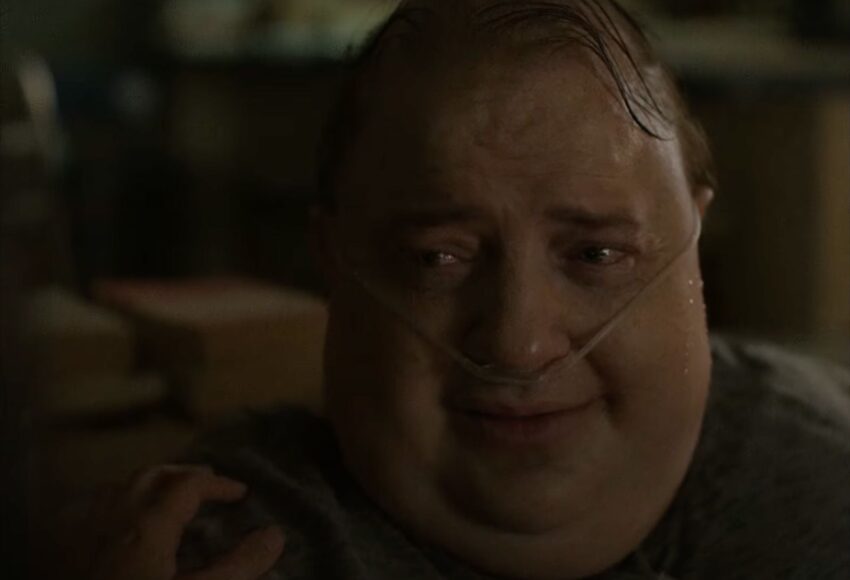The Whale: The Road to Redemption Takes Many Shapes

Brenden Fraser Outshines Aronofsky’s Ironically Thin Adaptation
I think, therefore, I am. And who I am, who we all are, is human.
For an ideal so deceptively simple, it’s something that weighs down on us all. Because no five-letter word can encapsulate what it means to have lived, not entirely. Nothing can describe how it feels to lose a loved one or how hard it is to live with something you’ve done that you just can’t take back. At the end of it all, we’re all just trying to find some sort of connection before it’s too late.
At the end of it all, we’re all just Charlie. Our titular whale.
I, like many, love a comeback tale. Whether it’s the McConaissance or the more recent rise of Ke Huy Quan, everyone’s favorite Indiana Jones sidekick turn fanny-pack ninja, there’s no denying the sheer joy of watching someone who’s been tossed aside come out on top against all odds. So, of course, I was thrilled to hear of a Fraser/Aronofsky vehicle tailored around the story of a 600-pound man trying to reconnect with the estranged daughter he abandoned years before. Sounds like the perfect Oscar-worthy comeback for both, right?
Well, it worked out for one of them, at least.
Based off Samuel D. Hunter’s play of the same name (Hunter also penned the film’s script), The Whale depicts the final days of Charlie, a severely obese, reclusive English teacher, isolated from the world in his small, two-bedroom condo. With the exception of a handful of shots, the entire film takes place in this run-down, decaying complex. Charlie spends his days here teaching remote classes with his laptop camera shut off while stuffing his swelling throat with whatever is sitting around that looks tasty enough. Aronofsky brings this restrained space to life through a 1.33:1 ratio, reducing his subjects to a square frame as the world outside the frame implodes around them. But even with this intimate viewpoint, most of the film comes off as forced and fabricated, as if it’s coming from the pages of a first draft instead of the realized work of art it’s pretending to be.
The film’s whale-sized (I’m sorry, I just couldn’t resist) asset is its ensemble. Not only does everyone play their part exceptionally well (Chau, Fraser, and another single-scene cameo from Samatha Morton stand out particularly), but each player plays a pivotal role in understanding our titular protagonist and the events that have brought him to death’s door. Aronofksy has always had a keen eye for casting, often giving meaty roles to those you would least expect(i.e., Marlon Waynes in Requiem for a Dream and Mila Kunis in Black Swan), and The Whale is no different. The casting of Fraser is, particularly, an inspired choice that provides the pathos this character need. Even under all that blubber, you never mistake the man sitting underneath, and that’s due to the humanity of Fraser’s performance. Charlie is never treated as a pathetic example of out-of-control obesity. He’s a deeply intelligent and tender man who possesses vulnerabilities and humor, and fear. And behind all the prosthetics, Fraser brings to life all of these emotions perfectly.
And then, there’s the rest of the film.
While watching The Whale, I couldn’t help but feel that I was watching a dumb-downed Aronofsky character piece, like an imitator who had just finished watching The Wrestler for the first time and decided to make a movie. The film stumbles from plot point to plot point at such an odd pace that the arcs of these beautifully-drawn characters feel rushed and disjointed. This is primarily shown in Charlie’s backstory. Each time the audience is able to digest one piece of information, the film throws another monumental development, never allowing the character to develop organically. By the end, information is so rushed and forced down our throats that the time frame of the past begins to become murky, making what we see in the present all the less impactful.
In addition to this clunky pace, the nearly two-hour film often treads into unwarranted territory, focusing on certain subplots that add little to the story or Charlie’s overall arc. There were moments that slogged on without no real purpose or reason. Not only do these sequences come off as filler, they distract from the more substantial material at play. Fraser and the rest of the cast do their best to elevate this material but can never quite rise above the gratuitous set pieces.
Even in all of its mundanity, The Whale teaches us what it means to be human and that the road to redemption takes many forms. Being upwards of 600 pounds, Charlie can be found repulsive to those who don’t know him or understand him. But even with the massive rolls of fat, Charlie is a profoundly inspiring person. Someone that shines bright in the otherwise dim world around them. Through all the messiness, sweat, and tears, The Whale finds value in the little things. The things that bind us all to the human condition.


Leave a Reply